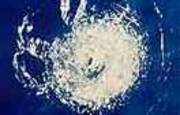What can be done?
Satellites are owned and operated by many governments and commercial companies. It is not easy to agree how to control and reduce the amount of space debris being produced.
Using ground-based radar facilities and telescopes as well as a space based telescope, the American government tracks space debris. It maintains a catalogue of objects identified, partly to prevent their misinterpretation as hostile missiles.
The United Nations Committee on the Peaceful Uses of Outer Space published its Technical Report on Space Debris in 1999. In 2002, the Inter-agency Space Debris Coordination Committee (IADC) published its Space Debris Mitigation Guidelines. The IADC assessed the sources of space debris:
| Categories of Space Debris |
|---|
| Mission-related objects | Objects released by design e.g. needles and balls for experiments |
|---|
| Unintentionally- released objects e.g dropped tools and leaking liquids |
On-orbit
break-ups
| Intentional destruction e.g. before re-entry to minimise casualties on the ground or for military experiments |
|---|
| Accidental break-ups e.g. explosions on mission failure |
| On-orbit collisions with other objects |
Mission-terminated
space systems | Old systems left in orbit |
|---|
(Source: Based on Inter-agency Space Debris Coordination Committee IADC-04-06)

Then the IADC recommended new guidelines. These aim to:
limit the objects released during normal operations
prevent on-orbit break-ups
require operators to remove spacecraft and orbital stages at the end of their mission lifetime from the useful, densely-populated orbit regions of space
A European Code of Conduct for Space Debris Mitigation came into effect in 2004. It covers the production, operation and disposal of satellites. However, none of these guidelines are legally binding.
 Space warfare
Space warfare




 Space warfare
Space warfare
What's your opinion?
Average rating




Not yet rated